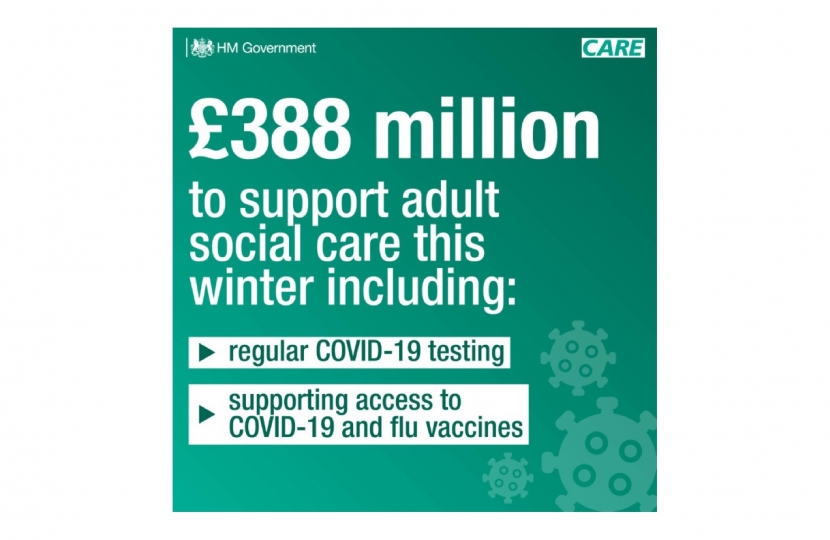
Yesterday the Government announced £388 million in support for care workers and care home residents, preventing the spread of COVID-19 and keeping residents safe through the coming winter months.
Protecting staff and residents in care homes has been a priority throughout the pandemic, and we are committed to supporting them during the winter months ahead. That is why the Government is delivering an additional £388 million for care homes to prevent the spread of infection this winter – helping to fund testing, infection control measures, and COVID-19 and flu vaccines for care workers.
The £388.3 million support includes £25 million to support care workers to access COVID-19 and flu vaccines over the winter months. This will ensure social care staff who need to travel to receive their COVID-19 or flu vaccinations are paid their usual wages to do so and can be support with travel costs.
To boost flu vaccine uptake among social care staff, GP practices will be able to vaccinate care home staff that are not registered at their practice. Uptake will be regularly monitored by region to allow a targeted approach, and more flu vaccines will be available earlier this year.
Continued funding to prevent infection spreading and provide testing will be delivered through the Infection Control and Testing Fund (ICTF), which was first introduced in May 2020 with an investment of £600 million. Today’s funding announcement includes £237 million for Infection Control measures and £126.3 million for testing costs. This will allow testing to continue for staff, residents and visitors to ensure residents can see their loved ones as safely as possible.
As part of supporting good quality discharge the Government will also extend the use of designated settings for people discharged from hospital to a care home with a positive COVID-19) test. This includes extending the Designated Settings Indemnity Scheme to March 2022, supported by £478 million which has already been pledged to continue hospital discharge programmes through the winter until March 2022.
From November 11 any staff or visiting professionals entering a care home will need to provide evidence of their COVID-19 vaccination or exemption status. Vaccines save lives and it is our responsibility to do everything we can to reduce the risk for those in care, who are some of the most clinically vulnerable to COVID-19 and other infectious diseases.
The Government will also launch a consultation on extending free PPE beyond March 2022 for Health and Social Care on 1 October.
This funding will mean care homes have the resources and support they need to keep residents and staff safe through the winter. For more information on the additional funding to help adult social care this winter, including the Infection prevention and control measures to protect residents and staff and comments from the Health and Social Care Secretary, please visit: https://www.gov.uk/government/news/additional-funding-to-help-adult-social-care-this-winter.
40 Community Diagnostic Centres Launching Across England

Today the Government announced 40 new Community Diagnostic Centres across England, providing a one-stop-shop for patients to boost early diagnoses and tackle the NHS backlog.
Providing testing and earlier diagnosis will be key to reducing waiting lists and saving lives, as we focus on tackling the backlog and addressing health disparities across the country. That is why the Government is establishing 40 new Community Diagnostic Centres – providing a full range of tests to patients to catch illnesses at the earliest signs – increasing NHS capacity and saving lives as more patients seek treatment for non-Covid related health problems.
The new one-stop-shops for checks, scans and tests will be backed by a £350 million investment from the Government to provide around 2.8 million scans in the first full year of operation.
The centres will help achieve:
- Earlier diagnoses for patients through easier, faster, and more direct access to the full range of diagnostic tests needed to understand patients’ symptoms including breathlessness, cancer, ophthalmology.
- A reduction in hospital visits which will help to reduce the risk of COVID-19 transmission.
- A reduction in waits by diverting patients away from hospitals, allowing them to treat urgent patients, whilst the Community Diagnostic Centres focus on tackling the backlog.
- A contribution to the NHS’ net zero ambitions by providing multiple tests at one visit, reducing the number of patient journeys and helping to cut carbon emissions and air pollution.
GPs will be able to refer patients to a centre so they can access life-saving checks closer to home and be diagnosed for a range of conditions, rather than travelling to hospital. This will be more convenient for patients, more efficient and more resilient to the risk of cancelled tests in hospitals due to COVID-19. The centres will be staffed by a multi-disciplinary team of staff including nurses and radiographers and are open 7 days a week.
All cancer services are back to or above pre-pandemic levels with almost half a million people checked for cancer in June and July – among the highest numbers on record – while more than fifty thousand people started treatment for cancer in the same period, a 32% increase on the same period last year. The centres will continue to further level up access to vital cancer tests and other tests to tackle the backlogs that have built up during the pandemic.
The centres will begin providing services over the next six months, with some already up and running, and will be fully operational by March 2022.
These centres will help to increase the NHS’s capacity and bust the backlogs – levelling up health outcomes as we build back better. For more information on the 40 Community Diagnostic Centres Launching Across England, including where some of the major new centres are being rolled out and comments from the Health and Social Care Secretary, please visit: https://www.gov.uk/government/news/40-community-diagnostic-centres-launching-across-england.
